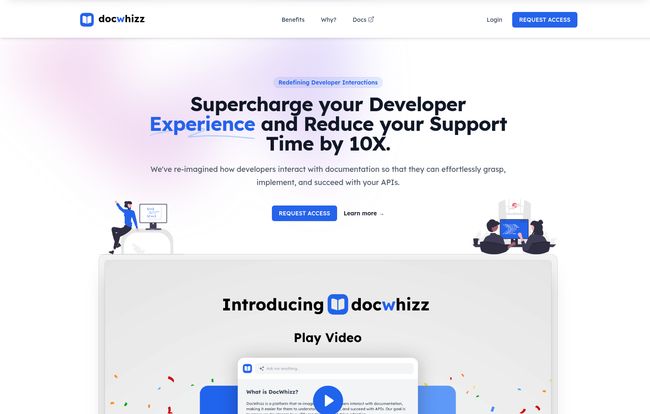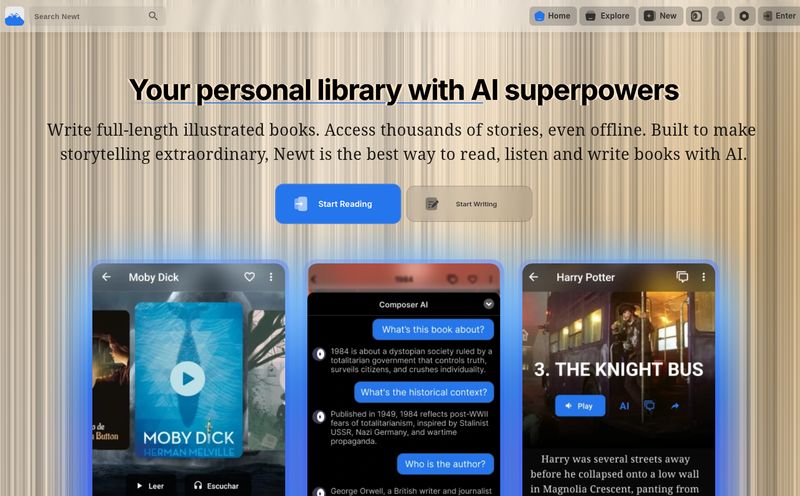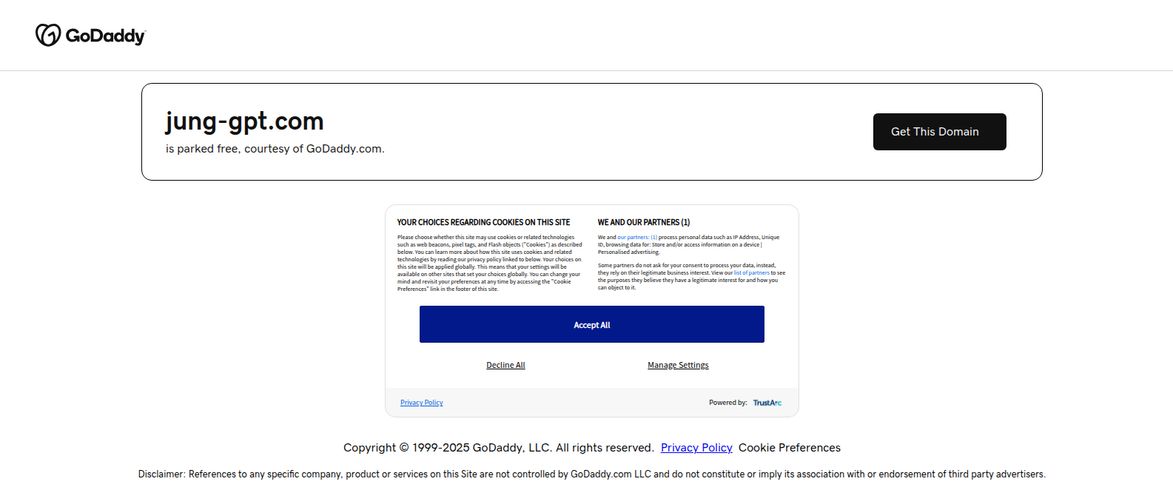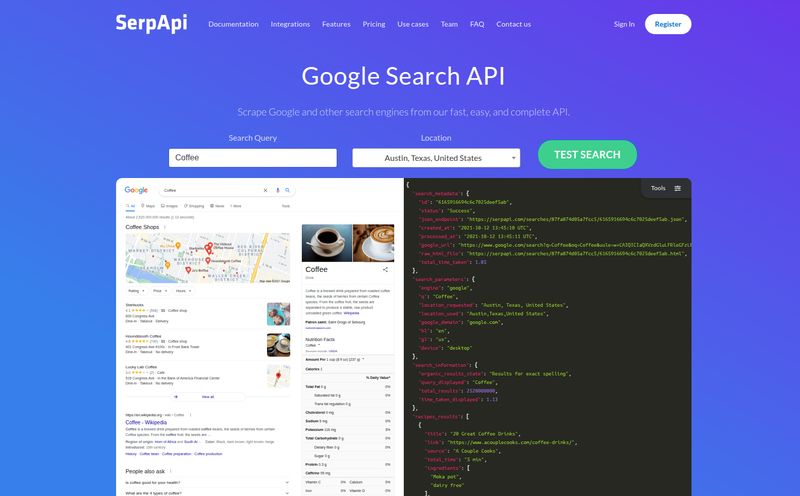We've all been there. Staring at a page of API documentation that feels like it was written in a forgotten dialect, translated by a machine, and then set on fire. You’re trying to build something cool, something innovative, but instead you're stuck in a loop of `Cmd+F`, vague explanations, and missing examples. It’s the digital equivalent of trying to assemble IKEA furniture with half the instructions missing. Frustrating, right?
For years, we've treated documentation as a necessary evil. A box to be ticked. But the industry is waking up to a hard truth: developer experience (DX) isn't just a buzzword, it's a bottom-line metric. Poor DX leads to developer churn, abandoned projects, and a support queue that looks like a rush-hour traffic jam. When your primary users are developers, their happiness is directly tied to your revenue.
So, when a tool like DocWhizz pops up on my radar, claiming to “Supercharge your Developer Experience,” my cynical-but-hopeful SEO heart skips a beat. Could this be the answer? An AI that tames the documentation beast? Let's take a look.
What Exactly is DocWhizz? Hint: It's Not Just Another Chatbot.
First off, let's get one thing straight. The folks at DocWhizz are very clear that this isn't just another chatbot slapped onto a website. I've seen enough of those to know they often create more problems than they solve. You ask a simple question and get a link to the very documentation you couldn't understand in the first place. Thanks, I guess?
DocWhizz is different. It's pitched as an expert AI assistant that you train specifically on your own documentation, your support tickets, your website content—your entire universe of knowledge. It doesn't just point to articles; it digests them. It learns your API endpoints, understands your parameters, and can generate personalized code snippets on the fly. It’s like having a senior engineer who has memorized every single line of your docs, available 24/7, and never gets tired of answering the same question for the hundredth time.

Visit DocWhizz
The idea is to transform a static, often-confusing library of information into a dynamic, interactive conversation. A developer can ask, “How do I authenticate a user with a social login using Python?” and get back not a link, but a ready-to-use code block and a clear explanation. That's a huge leap forward.
Why Developer Experience (DX) Should Be Your New Obsession
I see a lot of companies pour millions into marketing to developers, only to fumble the ball at the one-yard line with a terrible onboarding experience. Here’s a stat from the DocWhizz site that should be projected onto the wall of every boardroom: $40 billion in product purchase decisions are influenced by developer experience.
Let that sink in. Forty. Billion. Dollars.
This isn't some fluffy, feel-good concept anymore. It's cold, hard cash. Their site also mentions that over a third of developers have bailed on a product entirely because they couldn't get it up and running easily. We're talking about direct, measurable, lost revenue because of bad docs and poor support. When 52% of developers say they find it frustrating to locate what they need in API docs, you don’t have a documentation problem; you have a business problem.
A Look Under the Hood: Key DocWhizz Features
So, how does DocWhizz propose to solve this billion-dollar headache? I've been digging through their site, and a few things stand out.
The Plug-and-Play Promise
One of the biggest hurdles for adopting any new tool is the integration process. Nobody has time for a six-month implementation project. DocWhizz seems to get this. They advertise a “plug-and-play setup” with integrations for common documentation platforms like Readme, GitBook, Archbee, and Confluence. You essentially point it at your existing knowledge sources, and it starts learning. That low barrier to entry is, in my opinion, a massive selling point.
More Than Answers, It's About Insights
This is the part that really got my attention as a data-nerd. DocWhizz doesn't just answer questions; it listens. The platform includes a dashboard that analyzes what your users are asking. What are the most common points of confusion? Where are the gaps in our documentation? Are a lot of people getting stuck on the same authentication step?
This transforms your support from a reactive cost center into a proactive product improvement engine. You're not just putting out fires; you're finding the faulty wiring and fixing it before the next fire starts. That is incredibly powerful.
Personalized Code Examples on Demand
Let's face it, developers learn by doing. Reading theory is one thing, but seeing a working code snippet you can adapt is another. The ability for DocWhizz to generate personalized examples is a game-changer for reducing time-to-first-call. It accelerates that “aha!” moment when a developer successfully integrates your API and sees it work. That positive feedback loop is crucial for adoption and long-term loyalty.
My Honest Take: The Good, The Bad, and The Missing
Alright, no tool is perfect. As an SEO and tech analyst, I'm paid to be a professional skeptic. Here's my breakdown.
The Good Stuff is pretty obvious. The potential to slash support time is a huge win for any company's P&L. For scaling startups, this could mean delaying the hire of several support engineers. The focus on improving DX is spot-on with where the industry is heading. And those analytics… finding out what your customers are actually struggling with is a goldmine. It's like having a 24/7 focus group for free.
The Potential Hiccups are just as important to consider. The whole system hinges on a fundamental principle: garbage in, garbage out. If your existing documentation is a complete mess—inaccurate, outdated, and poorly structured—the AI is going to learn from that mess. It might give confident, yet completely wrong, answers. So, you'll likely need to do a documentation audit and cleanup before you can even get started. This isn't a magic wand for bad content; it's an amplifier for good content.
The Big Question Mark: Pricing. Now for the fun part. I went looking for a pricing page, ready to analyze their tiers and models. And… well, I found a 404 page. Classic. While this might just be a temporary glitch, it's a bit of an own-goal for a company focused on user experience. Based on my experience with similar B2B SaaS tools, I'd wager they operate on a “Request a Demo” model, with custom pricing based on usage, number of documentation sources, or monthly active users. But for now, your guess is as good as mine.
Who is DocWhizz Actually For?
This isn't a tool for everyone. If you’re selling handmade candles on Etsy, you can probably skip this one. But if you're a SaaS company with a public-facing API, you are square in their crosshairs. If you're a large enterprise with sprawling internal documentation for your engineering teams, this could be a lifesaver for internal efficiency. Essentially, if you look at your monthly support ticket volume and feel a small sense of dread, DocWhizz is probably built for you.
It's for companies that understand that the cost of a lost developer isn't just one lost user; it's the potential for a lost application, a lost integration, and a lost champion within another organization.
Frequently Asked Questions about DocWhizz
Let's clear up a few common questions I can see people having.
How is DocWhizz different from a generic AI chatbot like ChatGPT?
The key difference is the data source. A generic chatbot knows a little bit about everything. DocWhizz is trained to be a deep expert on one thing: your product. It only uses your documentation and provided sources, so it gives context-specific, accurate answers without hallucinating or pulling in irrelevant public information.
What kind of documentation do I need to get started?
While the setup is easy, the results depend on your input. You'll need reasonably well-structured, up-to-date documentation. This could be in a platform like GitBook or Readme, or even a well-organized Confluence space. The cleaner your source material, the better your AI assistant will be.
How long does it take to set up DocWhizz?
The site advertises a “plug-and-play” setup, implying it’s quite fast. You’ll likely connect your documentation sources via their dashboard, and the AI will begin training. The actual time to a fully functional assistant probably depends on the size and complexity of your docs, but it seems to be measured in hours or days, not weeks or months.
Does it replace human support teams?
No, and that's not the goal. It aims to handle the vast majority of repetitive, documentation-related questions. This frees up your human support experts to focus on the truly complex, nuanced, and high-value customer problems that an AI can't solve. It's about augmentation, not replacement.
Can DocWhizz analyze user questions to improve my product?
Yes, and this is one of its most valuable features. The insights dashboard shows you what users are struggling with, which can directly inform your documentation roadmap, your UI/UX design, and even your product's feature development.
What's the pricing for DocWhizz?
As of this writing, there is no public pricing information available on their website. You'll need to contact their team directly and likely schedule a demo to get a custom quote based on your company's needs.
The Final Verdict on DocWhizz
So, is DocWhizz the real deal? The concept is rock solid. The market need is undeniable. In a world where developers have more power and choice than ever before, betting on developer experience is one of the smartest moves a tech company can make. DocWhizz isn't just selling an AI tool; it's selling a solution to a multi-billion dollar problem.
While I'd love to see a transparent pricing page, the value proposition is compelling. If your support team is drowning in tickets and your developers are frustrated, DocWhizz is absolutely worth a closer look. It might just be the map—and the guide—your users need to navigate the labyrinth of your documentation and find success with your product.
Reference and Sources
- DocWhizz Official Website: https://www.docwhizz.com/
- An interesting take on Developer Experience from a16z: What Is Developer Experience (DX)?



